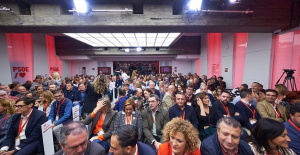LUXEMBOURG, 3 Oct. (EUROPE PRESS) -
Several ministers of Economy and Finance of the euro zone have warned this Monday of the risk of "fragmentation" of the single market upon arrival at a meeting of the Eurogroup, days after Germany announced a plan of 200,000 million euros in aid to reduce the electricity bill for businesses and homes.
Upon entering the Eurogroup in Luxembourg, the Commissioner for the Economy, Paolo Gentiloni, advocated avoiding "the fragmentation of the single market" and thinking of tools that can contribute to solidarity.
"Solidarity is not just on German shoulders. I think this is something we have to discuss at a European level," stressed the Commissioner for the Economy, who has given the pandemic as an example of "how solidarity" can serve "to react to crises and secure financial markets.
In a similar vein, the economic vice-president of the European Commission, Valdis Dombrovskis, urged us to be "cautious" with the mix of economic policies that are implemented, and stressed that these must be targeted and temporary, to "ensure that the fiscal measures we are taking will bring us back to 2% inflation", in line with the guidelines of the European Central Bank.
For his part, the German Minister of Finance, Christian Lindner, has defended upon his entrance to the meeting of Ministers of Economy of the Nineteen that the German Government has launched a "protective shield" for households and the economy of up to 200,000 million of euros.
"We have taken this measure for the next two years," the German stressed, emphasizing that the measure is not only for 2023, but will extend to 2024, something that, considering the size of the German economy, has been estimated " provided".
"It is not our intention to boost demand in the economy. It is not our intention to completely remove the burden on households in the economy. It is a measure to protect the key structures of our economy," the German minister defended.
The president of the Eurogroup, Paschal Donohoe, has highlighted the importance of coordinating national economic policies in order to improve the resilience of the euro zone.
"We have the RepowerEU initiative and we have the current implementation of the Recovery Fund, which are very powerful tools to drive economic convergence" and achieve practical effects to achieve the European commitment to solidarity.
Asked about the German emergency plan, the First Vice President and Minister of Economic Affairs and Digital Transformation, Nadia Calviño, has defended a united response at European level.
"At this time when we are also facing a global challenge and an international challenge, we have to act together, we strongly support the EU reinforcing its tools to respond to Putin's blackmail," the first vice president told the press. entry to the Eurogroup in Luxembourg.
The Belgian Finance Minister, Vincent Van Peteghem, has defended that the "European project is based on solidarity, on working together" and on "coordination" for which he has valued that the finance ministers of the euro zone meet to discuss these issues.
"It is important that we show unity, that we act as a block. That today, in these times of crisis, we believe in predictability even though we are in uncertain times," added the Belgian minister.
In this sense, Calviño has highlighted that "as happened with the pandemic, we are stronger when we act together, with important decisions, with determination and also with solidarity. This was the recipe we used to respond to the pandemic".
More harshness has been shown by the French Finance Minister, Bruno Le Maire, who has warned of the need to agree on a European response to the rise in energy prices and has urged that aid be properly adjusted to avoid a "fragmentation" of the single market that endanger fair competition within the European Union.
"It is essential that financial aid be focused", Le Maire stressed, adding that it is something "indispensable if we want conditions of fair competition between Member States".

 Exploring Cardano: Inner Workings and Advantages of this Cryptocurrency
Exploring Cardano: Inner Workings and Advantages of this Cryptocurrency Seville.- Economy.- Innova.- STSA inaugurates its new painting and sealing hangar in San Pablo, for 18 million
Seville.- Economy.- Innova.- STSA inaugurates its new painting and sealing hangar in San Pablo, for 18 million Innova.- More than 300 volunteers join the Andalucía Compromiso Digital network in one month to facilitate access to ICT
Innova.- More than 300 volunteers join the Andalucía Compromiso Digital network in one month to facilitate access to ICT Innova.-AMP.- Ayesa acquires 51% of Sadiel, which will create new technological engineering products and expand markets
Innova.-AMP.- Ayesa acquires 51% of Sadiel, which will create new technological engineering products and expand markets The PSOE is holding a Federal Committee this Saturday that will serve to close ranks with Sánchez so that he does not resign
The PSOE is holding a Federal Committee this Saturday that will serve to close ranks with Sánchez so that he does not resign The Ibex 35 closes the week at its highest since 2015 and is already looking at 11,200
The Ibex 35 closes the week at its highest since 2015 and is already looking at 11,200 RELEASE: Dogfy Diet leads in canine nutrition with revolutionary natural solutions
RELEASE: Dogfy Diet leads in canine nutrition with revolutionary natural solutions STATEMENT: Fernando Belasteguín Curarti ambassador in China
STATEMENT: Fernando Belasteguín Curarti ambassador in China How Blockchain in being used to shape the future
How Blockchain in being used to shape the future Not just BTC and ETH: Here Are Some More Interesting Coins Worth Focusing on
Not just BTC and ETH: Here Are Some More Interesting Coins Worth Focusing on UPV students build a prototype of a wooden house to move to Equatorial Guinea
UPV students build a prototype of a wooden house to move to Equatorial Guinea The UA opens the call for the Impulso 2024 Awards for the best innovative business initiatives
The UA opens the call for the Impulso 2024 Awards for the best innovative business initiatives ALI, virtual assistant from Alicante, internationally recognized by the OECD
ALI, virtual assistant from Alicante, internationally recognized by the OECD Retrópolis brings the golden age of video games and computing to the UPV
Retrópolis brings the golden age of video games and computing to the UPV A million people demonstrate in France against Macron's pension reform
A million people demonstrate in France against Macron's pension reform Russia launches several missiles against "critical infrastructure" in the city of Zaporizhia
Russia launches several missiles against "critical infrastructure" in the city of Zaporizhia A "procession" remembers the dead of the Calabria shipwreck as bodies continue to wash up on the shore
A "procession" remembers the dead of the Calabria shipwreck as bodies continue to wash up on the shore Prison sentences handed down for three prominent Hong Kong pro-democracy activists
Prison sentences handed down for three prominent Hong Kong pro-democracy activists ETH continues to leave trading platforms, Ethereum balance on exchanges lowest in 3 years
ETH continues to leave trading platforms, Ethereum balance on exchanges lowest in 3 years Investors invest $450 million in Consensys, Ethereum incubator now valued at $7 billion
Investors invest $450 million in Consensys, Ethereum incubator now valued at $7 billion Alchemy Integrates Ethereum L2 Product Starknet to Enhance Web3 Scalability at a Price 100x Lower Than L1 Fees
Alchemy Integrates Ethereum L2 Product Starknet to Enhance Web3 Scalability at a Price 100x Lower Than L1 Fees Mining Report: Bitcoin's Electricity Consumption Declines by 25% in Q1 2022
Mining Report: Bitcoin's Electricity Consumption Declines by 25% in Q1 2022 Oil-to-Bitcoin Mining Firm Crusoe Energy Systems Raised $505 Million
Oil-to-Bitcoin Mining Firm Crusoe Energy Systems Raised $505 Million Microbt reveals the latest Bitcoin mining rigs -- Machines produce up to 126 TH/s with custom 5nm chip design
Microbt reveals the latest Bitcoin mining rigs -- Machines produce up to 126 TH/s with custom 5nm chip design Bitcoin's Mining Difficulty Hits a Lifetime High, With More Than 90% of BTC Supply Issued
Bitcoin's Mining Difficulty Hits a Lifetime High, With More Than 90% of BTC Supply Issued The Biggest Movers are Near, EOS, and RUNE during Friday's Selloff
The Biggest Movers are Near, EOS, and RUNE during Friday's Selloff Global Markets Spooked by a Hawkish Fed and Covid, Stocks and Crypto Gain After Musk Buys Twitter
Global Markets Spooked by a Hawkish Fed and Covid, Stocks and Crypto Gain After Musk Buys Twitter Bitso to offset carbon emissions from the Trading Platform's ERC20, ETH, and BTC Transactions
Bitso to offset carbon emissions from the Trading Platform's ERC20, ETH, and BTC Transactions Draftkings Announces 2022 College Hoops NFT Selection for March Madness
Draftkings Announces 2022 College Hoops NFT Selection for March Madness



























